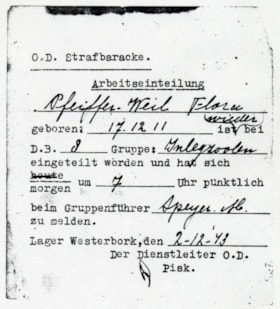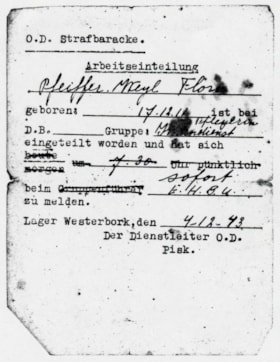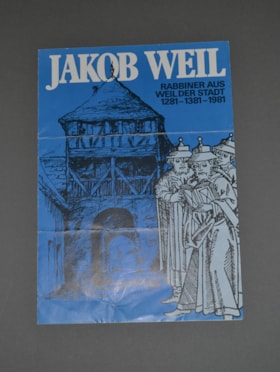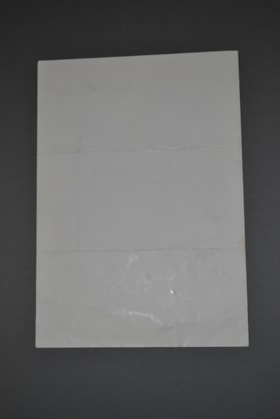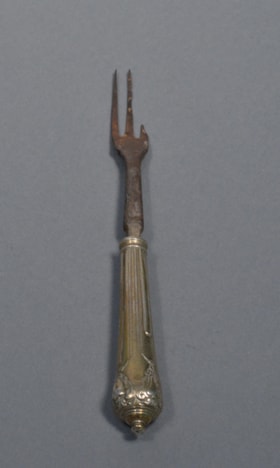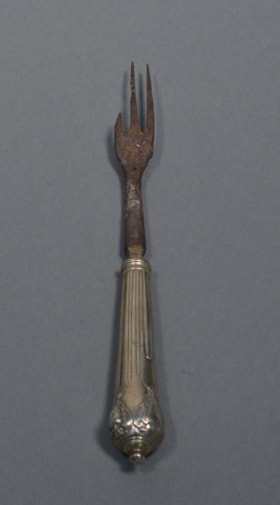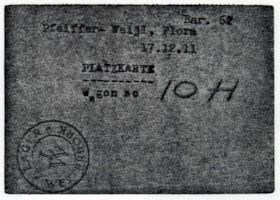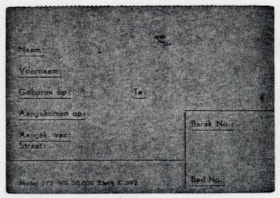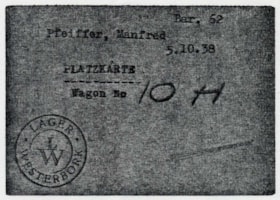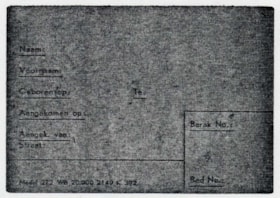Narrow Results By
Card
https://www.cjhn.ca/link/cjhn51186
- Collection
- Montreal Holocaust Museum
- Description Level
- Item
- Material Type
- textual record
- Physical Description
- Card : Paper : Black, White ; Ht: 5,25 in. x W: 4 in.
- Date
- December 2, 1943
- Collection
- Montreal Holocaust Museum
- Description Level
- Item
- Material Type
- textual record
- Physical Description
- Card : Paper : Black, White ; Ht: 5,25 in. x W: 4 in.
- Other Title Information
- Documentary Artifact
- Date
- December 2, 1943
- Physical Condition
- Good
- Language
- German
- Notes
- Narrative: Working card issued for Flora Pfeiffer by punitive barracks in Westerbork
- Accession No.
- 1990.88.09
- Name Access
- Pfeiffer, Flora
- Archival / Genealogical
- Archival Descriptions
- Repository
- Montreal Holocaust Museum
Images
Card
https://www.cjhn.ca/link/cjhn51277
- Collection
- Montreal Holocaust Museum
- Description Level
- Item
- Material Type
- textual record
- Physical Description
- Card : Paper : Black, White ; Ht: 5,25 in. x W: 4 in.
- Date
- December 4, 1943
- Collection
- Montreal Holocaust Museum
- Description Level
- Item
- Material Type
- textual record
- Physical Description
- Card : Paper : Black, White ; Ht: 5,25 in. x W: 4 in.
- Other Title Information
- Documentary Artifact
- Date
- December 4, 1943
- Physical Condition
- Good
- Language
- German
- Notes
- 1 page, One-sided. Narrative: Working cards issued for Flora Pfeiffer by punitive barracks in Westerbork
- Accession No.
- 1990.88.10
- Name Access
- Pfeiffer, Flora
- Archival / Genealogical
- Archival Descriptions
- Repository
- Montreal Holocaust Museum
Images
Jakob Weil: Rabbiner Aus Weilder Stadt 1281-1381-1981
https://www.cjhn.ca/link/cjhn47932
- Collection
- Montreal Holocaust Museum
- Description Level
- Item
- Material Type
- textual record
- Physical Description
- Pamphlet : printed, folded : blue, white, black
- Date
- 1981
- Collection
- Montreal Holocaust Museum
- Description Level
- Item
- Material Type
- textual record
- Physical Description
- Pamphlet : printed, folded : blue, white, black
- Other Title Information
- Documentary Artifact
- Date
- 1981
- Physical Condition
- Good
- Language
- German
- Notes
- 1 piece of stiff paper folded in half to make 4 sections: cover (front and back) and 2 inner pages with text. The cover is of an illustration of the Jewish gate and of 3 men standing in a group, wearing hats with a point, the one in front middle is holding a book. On the interior, left side of the booklet, contains a brief history of the situation for Jews in the years 1281, 1381 and 1981 (with special focus on Rabbi Jakob Weil). The right side shows the program for three events (lecture of Dr. Helmut Veitshans) on January 16th, 18th and March 8th 1981.
- Accession No.
- 1990.88.19
- Name Access
- Pfeiffer, Flora
- Archival / Genealogical
- Archival Descriptions
- Repository
- Montreal Holocaust Museum
Images
Silver cutlery
https://www.cjhn.ca/link/cjhn60385
- Collection
- Montreal Holocaust Museum
- Description Level
- Item
- Material Type
- object
- Physical Description
- Spoon : cast (moulded), cut : silver ; Ht: 2 cm x W: 4 cm x De: 19,1 cm
- Collection
- Montreal Holocaust Museum
- Description Level
- Item
- Material Type
- object
- Physical Description
- Spoon : cast (moulded), cut : silver ; Ht: 2 cm x W: 4 cm x De: 19,1 cm
- Other Title Information
- Food Service T&E
- Physical Condition
- Good
- Notes
- Deep bowl with high relief embellishments on the underside. Bowl extends from a handle with a raised rounded surface with a decorative filligreed pattern in the centre. The edges (both sides) have decortative cut designs. Narrative: The donor's, Dr. Pfeiffer, great granduncle was an ordained rabbi in the mid nineteenth century. He was ostracized when he abandoned orthodoxy for Reform Judaism. He left Germany and went to Krakow where he had a synagogue. He went to war, at the end of the nineteenth century, obviously for Russia, as the Tsar employed him in Odessa to modernize the Jewish community in terms of welfare. In recognition of his extra ordinary work for the Jewish community and Odessa at large, the Tsar gave him a set of silver flatware. Since he had no children of his own, he gave the set to his nephew as a wedding gift. It was passed down to Dr. Pfeiffer's parents. When they left Germany for Holland in 1939 the Pfeiffers took the silver with them. Mrs. Pfeiffer and her sister-in-law buried it and other silverware on a farm. She also buried the top hat Mr. Pfeiffer had worn to his wedding. After the war they retrieved the artifacts, but the non silver parts had corroded. The set is now divided among the family.
- Accession No.
- 1990.88.16
- Name Access
- Pfeiffer, Flora
- Places
- Odessa, Russia, Europe
- Archival / Genealogical
- Archival Descriptions
- Repository
- Montreal Holocaust Museum
Images
Silver cutlery
https://www.cjhn.ca/link/cjhn76802
- Collection
- Montreal Holocaust Museum
- Description Level
- Item
- Material Type
- object
- Physical Description
- Knife : cast (moulded), cut : silver, brown ; Ht: 1,7 cm x W: 2 cm x De: 18,2 cm
- Collection
- Montreal Holocaust Museum
- Description Level
- Item
- Material Type
- object
- Physical Description
- Knife : cast (moulded), cut : silver, brown ; Ht: 1,7 cm x W: 2 cm x De: 18,2 cm
- Other Title Information
- Food Service T&E
- Physical Condition
- Poor
- Notes
- Blade extending from a rounded handle, which is wider at the bottom. Vertical lines are embellished on the handle, with a repeated filigreen pattern at the bottom, along the circumference. The very end tapers gradually inwards with a rouded nubbin at the point. Narrative: The donor's, Dr. Pfeiffer, great granduncle was an ordained rabbi in the mid nineteenth century. He was ostracized when he abandoned orthodoxy for Reform Judaism. He left Germany and went to Krakow where he had a synagogue. He went to war, at the end of the nineteenth century, obviously for Russia, as the Tsar employed him in Odessa to modernize the Jewish community in terms of welfare. In recognition of his extra ordinary work for the Jewish community and Odessa at large, the Tsar gave him a set of silver flatware. Since he had no children of his own, he gave the set to his nephew as a wedding gift. It was passed down to Dr. Pfeiffer's parents. When they left Germany for Holland in 1939 the Pfeiffers took the silver with them. Mrs. Pfeiffer and her sister-in-law buried it and other silverware on a farm. She also buried the top hat Mr. Pfeiffer had worn to his wedding. After the war they retrieved the artifacts, but the non silver parts had corroded. The set is now divided among the family.
- Accession No.
- 2012X.17.01
- Name Access
- Pfeiffer, Flora
- Places
- Odessa, Russia, Europe
- Archival / Genealogical
- Archival Descriptions
- Repository
- Montreal Holocaust Museum
Images
Silver cutlery
https://www.cjhn.ca/link/cjhn76895
- Collection
- Montreal Holocaust Museum
- Description Level
- Item
- Material Type
- object
- Physical Description
- Fork : cast (moulded), cut : silver, brown ; Ht: 1,7 cm x W: 2 cm x De: 20,6 cm
- Collection
- Montreal Holocaust Museum
- Description Level
- Item
- Material Type
- object
- Physical Description
- Fork : cast (moulded), cut : silver, brown ; Ht: 1,7 cm x W: 2 cm x De: 20,6 cm
- Other Title Information
- Food Service T&E
- Physical Condition
- Poor
- Notes
- 3 very thin tines, extending from a rounded handle, which is wider at the bottom. Vertical lines are embellished on the handle, with a repeated filigreen pattern at the bottom, along the circumference. The very end tapers gradually inwards with a rouded nubbin at the point. Narrative: The donor's, Dr. Pfeiffer, great granduncle was an ordained rabbi in the mid nineteenth century. He was ostracized when he abandoned orthodoxy for Reform Judaism. He left Germany and went to Krakow where he had a synagogue. He went to war, at the end of the nineteenth century, obviously for Russia, as the Tsar employed him in Odessa to modernize the Jewish community in terms of welfare. In recognition of his extra ordinary work for the Jewish community and Odessa at large, the Tsar gave him a set of silver flatware. Since he had no children of his own, he gave the set to his nephew as a wedding gift. It was passed down to Dr. Pfeiffer's parents. When they left Germany for Holland in 1939 the Pfeiffers took the silver with them. Mrs. Pfeiffer and her sister-in-law buried it and other silverware on a farm. She also buried the top hat Mr. Pfeiffer had worn to his wedding. After the war they retrieved the artifacts, but the non silver parts had corroded. The set is now divided among the family.
- Accession No.
- 2012X.17.03
- Name Access
- Pfeiffer, Flora
- Places
- Odessa, Russia, Europe
- Archival / Genealogical
- Archival Descriptions
- Repository
- Montreal Holocaust Museum
Images
Silver cutlery
https://www.cjhn.ca/link/cjhn76896
- Collection
- Montreal Holocaust Museum
- Description Level
- Item
- Material Type
- object
- Physical Description
- Knife : cast (moulded), cut : silver, brown ; Ht: 1,7 cm x W: 2 cm x De: 18,2 cm
- Collection
- Montreal Holocaust Museum
- Description Level
- Item
- Material Type
- object
- Physical Description
- Knife : cast (moulded), cut : silver, brown ; Ht: 1,7 cm x W: 2 cm x De: 18,2 cm
- Other Title Information
- Food Service T&E
- Physical Condition
- Poor
- Notes
- Blade extending from a rounded handle, which is wider at the bottom. Vertical lines are embellished on the handle, with a repeated filigreen pattern at the bottom, along the circumference. The very end tapers gradually inwards with a rouded nubbin at the point. Narrative: The donor's, Dr. Pfeiffer, great granduncle was an ordained rabbi in the mid nineteenth century. He was ostracized when he abandoned orthodoxy for Reform Judaism. He left Germany and went to Krakow where he had a synagogue. He went to war, at the end of the nineteenth century, obviously for Russia, as the Tsar employed him in Odessa to modernize the Jewish community in terms of welfare. In recognition of his extra ordinary work for the Jewish community and Odessa at large, the Tsar gave him a set of silver flatware. Since he had no children of his own, he gave the set to his nephew as a wedding gift. It was passed down to Dr. Pfeiffer's parents. When they left Germany for Holland in 1939 the Pfeiffers took the silver with them. Mrs. Pfeiffer and her sister-in-law buried it and other silverware on a farm. She also buried the top hat Mr. Pfeiffer had worn to his wedding. After the war they retrieved the artifacts, but the non silver parts had corroded. The set is now divided among the family.
- Accession No.
- 2012X.17.02
- Name Access
- Pfeiffer, Flora
- Places
- Odessa, Russia, Europe
- Archival / Genealogical
- Archival Descriptions
- Repository
- Montreal Holocaust Museum
Images
Ticket
https://www.cjhn.ca/link/cjhn51185
- Collection
- Montreal Holocaust Museum
- Description Level
- Item
- Material Type
- object
- Physical Description
- Ticket : paper : Black, Grey ; Ht: 3,75 in. x W: 2,5 in.
- Date
- 1943
- Collection
- Montreal Holocaust Museum
- Description Level
- Item
- Material Type
- object
- Physical Description
- Ticket : paper : Black, Grey ; Ht: 3,75 in. x W: 2,5 in.
- Other Title Information
- Exchange Medium
- Date
- 1943
- Physical Condition
- Good
- Language
- German
- Dutch
- Notes
- Double sided. One circular ink stamp in the bottom left corner. Narrative: Ticket for deportation train for Flora Pfeiffer, an inmate of Westerbork transit camp. After three months in Westerbork with her son Fred, Flora informed the German authorities that her husband was a Canadian citizen. It wasn't true but her husband was in reality interned in the internment camp of Île-aux-Noix in Quebec. Flora and fred were suddenly transported to the concentration camp of Bergen-Belsen camp, where they could potentially be exchanged against prisoners of war. They both survived the Holocaust.
- Accession No.
- 1990.88.67
- Name Access
- Pfeiffer, Flora
- Archival / Genealogical
- Archival Descriptions
- Repository
- Montreal Holocaust Museum
Images
Ticket
https://www.cjhn.ca/link/cjhn76799
- Collection
- Montreal Holocaust Museum
- Description Level
- Item
- Material Type
- object
- Physical Description
- Ticket : Paper : Black, White ; Ht: 3,75 in. x W: 2,5 in.
- Date
- 1943
- Collection
- Montreal Holocaust Museum
- Description Level
- Item
- Material Type
- object
- Physical Description
- Ticket : Paper : Black, White ; Ht: 3,75 in. x W: 2,5 in.
- Other Title Information
- Exchange Medium
- Date
- 1943
- Language
- German
- Dutch
- Notes
- Rectangular ticket, with a circular ink stamp in the bottom left corner. For Manfred and Flora Pfeiffer
- Accession No.
- 1990.88.68
- Name Access
- Pfeiffer, Flora
- Archival / Genealogical
- Archival Descriptions
- Repository
- Montreal Holocaust Museum
Images
Yellow star badge
https://www.cjhn.ca/link/cjhn45478
- Collection
- Montreal Holocaust Museum
- Description Level
- Item
- Material Type
- object
- Physical Description
- Yellow star badge : yellow, black ; Ht: 3,75 in. x W: 3,5 in.
- Date
- May 9, 1942-May 5, 1945
- Collection
- Montreal Holocaust Museum
- Description Level
- Item
- Material Type
- object
- Physical Description
- Yellow star badge : yellow, black ; Ht: 3,75 in. x W: 3,5 in.
- Other Title Information
- Personal Symbol
- Date
- May 9, 1942-May 5, 1945
- Physical Condition
- Good
- Language
- Dutch
- Notes
- Piece of cloth in the shape of a six pointed star, printed with the outline of a Star of David. Fabric is stretched onto a cardboard support. Narrative: Flora Pfeiffer stretched the Star on cardboard and attached a sling to be able to change it on her uniform as a nurse. It was worn in concentration camps Westerbork (The Netherlands) and Bergen-Belsen (Germany).
- Accession No.
- 1990.88.01
- Name Access
- Pfeiffer, Flora
- Archival / Genealogical
- Archival Descriptions
- Repository
- Montreal Holocaust Museum
Images
{{ server.message }}
